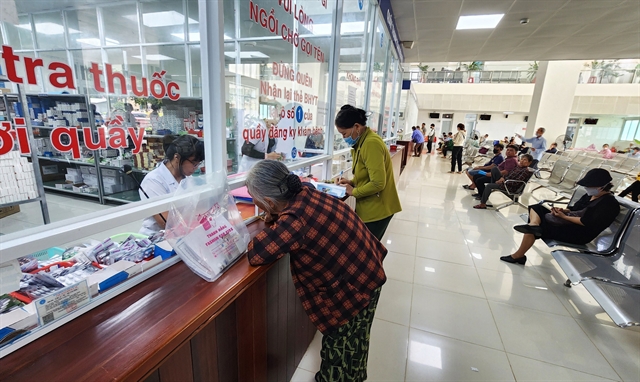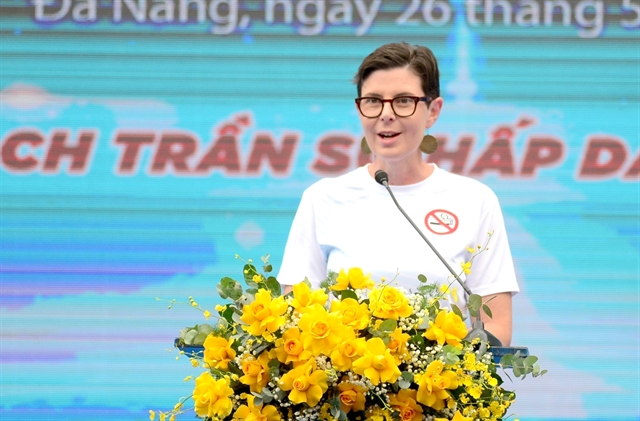 Opinion
Opinion

 |
| Dr Angela Pratt, WHO Representative in Việt Nam. — VNA/VNS Photo |
As non-communicable diseases linked to sugar-sweetened beverages continue to rise, Dr Angela Pratt, WHO Representative in Việt Nam, has outlined key measures to curb their consumption in an effort to safeguard public health.
Việt Nam is facing a growing burden of non-communicable diseases, with sugary beverages identified as a leading cause of various health issues. In your view, what strong measures should Việt Nam adopt to help ease this public health challenge?
The burden of non-communicable diseases (NCDs) in Việt Nam is rising steadily, with rates of overweight and obese people increasing at an alarming pace.
In 2015, 15.6 per cent of the population was classified as overweight or obese, a figure that rose to 19.6 per cent by 2021. Particularly concerning is the sharp rise among children and adolescents aged 5-19, for whom the rate more than doubled from 8.5 per cent in 2010 to 19 per cent in 2020.
Mounting evidence shows that regular consumption of sugary drinks significantly increases the risk of type 2 diabetes, cardiovascular disease, stroke and certain types of cancer. This habit is closely linked to weight gain and obesity in both children and adults, key risk factors for many serious health conditions. For children, in particular, sugary beverages pose a clear threat to long-term health.
Consumption of sugary drinks in Việt Nam has surged over the past 15 years. In 2023, the average Vietnamese consumer drank four times more sugary beverages than in 2009. On average, each person consumed nearly 70 litres per year, which is about 1.3 litres per week.
To counter this trend, WHO recommends taxing sugary drinks to raise their price and curb consumption. This approach has proven especially effective in altering the habits of children and adolescents, who are more price-sensitive.
Globally, around 110 countries have adopted taxes on sugary drinks. Experience has shown this to be a win–win solution, improving public health, lowering healthcare costs and increasing government revenue.
WHO emphasises the need to raise public awareness about sugar consumption. Few people realise that a single 330ml can of fizzy drink may contain up to ten teaspoons, or 40 grammes, of sugar.
Introducing a sugar-sweetened beverage tax, alongside public education campaigns promoting healthy eating, fits well with Việt Nam’s strategy to reduce NCDs. These efforts complement other key interventions targeting risk factors such as tobacco use and alcohol consumption.
WHO also welcomes the timely and thoughtful release of Conclusion 176-TB/VPTW, and in particular the remarks by General Secretary Tô Lâm, who underscored the importance of disease prevention and healthy living, including nutritious diets and abstaining from alcohol and tobacco.
When would be the most appropriate time for Việt Nam to introduce an excise tax on sugary beverages?
Now is the right time for Việt Nam to introduce an excise tax on sugary beverages.
Compared to other countries in the region and around the world, Việt Nam is lagging behind in this regard. With the National Assembly currently reviewing amendments to the Law on Excise Tax, this presents a valuable opportunity to impose a tax on sugary drinks.
Without timely intervention, the consumption of sugary beverages will likely continue to rise, leading to serious health consequences for children, adolescents, adults and society as a whole. In several countries, the beverage industry has attempted to block or delay such taxes by claiming they would result in economic losses.
However, global evidence shows these arguments do not hold. In practice, when a sugary drinks tax is implemented, consumers tend to switch to healthier alternatives with lower or no sugar content. Smart producers, in turn, adapt by reformulating their products to meet evolving consumer demand.
For these reasons, WHO urges National Assembly deputies and policymakers in Việt Nam to act now and take decisive steps to introduce this essential public health measure.
Should Việt Nam earmark a portion of the tax collected from alcohol, tobacco and sugary beverages to create a new funding source that would provide free annual health check-ups for the public?
We strongly welcome Việt Nam’s commitment to gradually introducing free annual health check-ups for all citizens from 2030, an important step toward early disease detection, reducing treatment costs and improving overall public health.
Việt Nam has several options to support this initiative, including earmarking revenue from taxes on tobacco, alcohol and sugary beverages, particularly if such taxes are introduced in the near future.
Global experience suggests that dedicating a portion of tax revenue to health can effectively support and sustain national health priorities. However, earmarking can also limit fiscal flexibility. It is therefore essential for policymakers to carefully consider both the benefits and potential drawbacks of ring-fencing tax income to fund specific health programmes. — VNS




